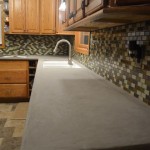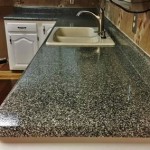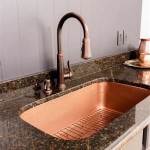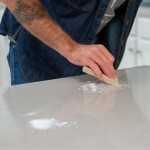How To Remove Rust Stains From Quartz Countertops
Quartz countertops are a popular choice for kitchens and bathrooms due to their durability, non-porous nature, and aesthetic appeal. However, despite their resilience, quartz surfaces are susceptible to stains, including rust. Rust stains, typically originating from metal objects left on the countertop, can be unsightly and challenging to remove if left untreated. Understanding the nature of rust and adopting appropriate cleaning techniques is crucial for preserving the pristine condition of quartz countertops.
Rust, scientifically known as iron oxide, forms when iron or iron-containing alloys like steel are exposed to oxygen and moisture. This electrochemical process leads to the oxidation of the metal, creating a reddish-brown, flaky coating that adheres to surfaces. On quartz countertops, rust often appears as a discolored patch or streak caused by items such as cast iron cookware, shaving cream cans, or metal utensils left in contact with the surface. The porous nature of the rust allows it to penetrate into the microscopic fissures of the quartz composite, making simple wiping ineffective.
Preventing rust stains is the most effective strategy. This involves consciously avoiding leaving metal objects directly on the counter for extended periods, especially when moisture is present. Using trivets or mats beneath metal items offers a protective barrier. Promptly drying spills and splashes also prevents the prolonged exposure to moisture that accelerates rust formation. When rust sources are unavoidable, regularly inspect the countertop for any early signs of staining to address the issue when it is most manageable.
Identifying the Severity of the Rust Stain
Before attempting any cleaning methods, it is essential to evaluate the severity of the rust stain. Light surface stains often respond well to gentle cleaning solutions. These stains typically appear as a faint discoloration or a slight surface deposit of rust. More severe or deeply embedded rust stains may require more aggressive treatments or professional assistance. These stains are characterized by a darker, more pronounced coloration and may be accompanied by a rough texture on the countertop surface. Attempting a more aggressive cleaning solution on a light stain could unnecessarily damage the quartz surface, while a gentle cleaner will be ineffective against a deeply entrenched stain. Carefully assessing the stain's depth and coverage is a critical first step in determining the most appropriate cleaning strategy.
Another critical aspect of assessing the rust stain involves identifying the source. Determining the origin of the rust stain aids in preventing its recurrence. If the stain originates from a specific item, such as a particular piece of cookware, taking steps to protect the counter from that item will prevent future staining. Additionally, identifying the source can provide clues as to the composition of the rust, which, in some instances, can inform the selection of an appropriate cleaning agent.
It is also worth examining the surrounding area for any damage to the quartz countertop itself. While quartz is generally resistant to scratching and etching, prolonged exposure to corrosive substances, particularly those found in some cleaning products, could potentially damage the surface. If the rust stain is accompanied by any signs of etching or pitting, it is advisable to consult with a professional stone restoration specialist.
Gentle Cleaning Methods for Light Rust Stains
For light rust stains on quartz countertops, mild cleaning solutions are generally sufficient to remove the discoloration without damaging the surface. The first approach should involve a simple mixture of dish soap and warm water. This solution is effective for removing surface-level dirt and grime, which may be contributing to the appearance of the stain. Apply the soapy water to the affected area using a soft cloth or sponge, gently scrubbing in a circular motion. Avoid using abrasive scrub pads or steel wool, as these can scratch the quartz surface.
After scrubbing, rinse the area thoroughly with clean water and dry it with a soft, lint-free cloth. If the stain persists, proceed to the next level of gentle cleaning. Another option is to create a paste of baking soda and water. Baking soda is a mild abrasive that can help to lift rust stains without scratching the quartz. Apply the paste to the affected area, let it sit for a few minutes, and then gently scrub with a soft cloth or sponge. Rinse thoroughly and dry the surface.
For stains that remain stubborn, consider using a specialized quartz cleaner. These cleaners are formulated to be safe for quartz surfaces and may contain ingredients that specifically target rust stains. Always follow the manufacturer's instructions carefully when using a specialized cleaner. Before applying any cleaning solution to the entire countertop, it is always recommended to test it on a small, inconspicuous area to ensure that it does not cause discoloration or damage.
Lemon juice is another natural option that can be used for light rust stains. The acidity of lemon juice can help to dissolve the rust. Apply lemon juice directly to the stain, let it sit for about 30 minutes, and then scrub gently with a soft cloth or sponge. Rinse thoroughly and dry the surface. However, be mindful that lemon juice is acidic and prolonged exposure could potentially damage the quartz. Frequent monitoring is required to prevent unintended damage.
More Aggressive Cleaning Methods for Stubborn Rust Stains
When gentle cleaning methods prove ineffective, more aggressive approaches may be necessary to remove stubborn rust stains from quartz countertops. One option is to use a commercial rust remover specifically formulated for use on stone surfaces. These products typically contain chemicals that dissolve rust without damaging the quartz. However, it is crucial to select a rust remover that is specifically labeled as safe for use on quartz or engineered stone. Always read and follow the manufacturer's instructions carefully, and test the product on a small, inconspicuous area before applying it to the entire stain.
Oxalic acid is another chemical compound that can be effective for removing rust stains. Oxalic acid is a naturally occurring acid found in some fruits and vegetables, and it is available in powdered form at most hardware stores. To use oxalic acid, mix a small amount of the powder with water to create a paste. Apply the paste to the rust stain, let it sit for a few minutes, and then scrub gently with a soft cloth or sponge. Rinse thoroughly and dry the surface. When working with oxalic acid, it is essential to wear gloves and eye protection, as it can be irritating to the skin and eyes.
Another approach involves using a rust stain remover gel. These gels are designed to cling to vertical surfaces, allowing the cleaning agent to remain in contact with the stain for an extended period. Apply the gel to the rust stain, let it sit for the recommended time (as specified by the manufacturer), and then rinse thoroughly with water. Rust stain remover gels are particularly useful for removing rust stains from areas that are difficult to reach, such as corners or edges.
An alternative to consider is using a pumice stone. Ensure the stone is wet and use it gently to rub the affected area. Pumice stone is an abrasive material and using it forcefully could damage the countertop. If the stains are particularly difficult to remove, consider using a specialized rust removal product designed specifically for use on quartz surfaces. These products often contain chemicals such as oxalic acid or other rust-dissolving agents, which can be effective at removing even the most stubborn stains. Always follow the manufacturer’s instructions when using these products and test them on a small, inconspicuous area of the countertop before applying them to the entire stain.
While these methods can be effective, it is important to proceed with caution and to avoid using abrasive cleaners or scrub pads, as these can scratch or dull the surface of the quartz. If the rust stain persists despite your best efforts, it may be necessary to consult with a professional stone restoration specialist.

The Easy Guide For How To Clean Quartz Countertops Tidbits Twine

How Can I Remove Rust Stains From A Cultured Quartz Countertop Surface Home Improvement Stack Exchange

How To Get The Rust Off Your Quartz Countertops In Seconds

Removing A Rust Stain From Quartz Countertop

How To Remove Marble Rust Stains Imperia Deep Clean

How To Treat Rust Stains On Your Quartz Countertops Common Mistakes Avoid

Housecleaning Tips Removing Rust From Countertops

How To Treat Rust Stains On Your Quartz Countertops Common Mistakes Avoid

Remove Rust Stain From Quartz Countertop Easy Guide

Housecleaning Tips Removing Rust From Countertops Youtube
See Also








